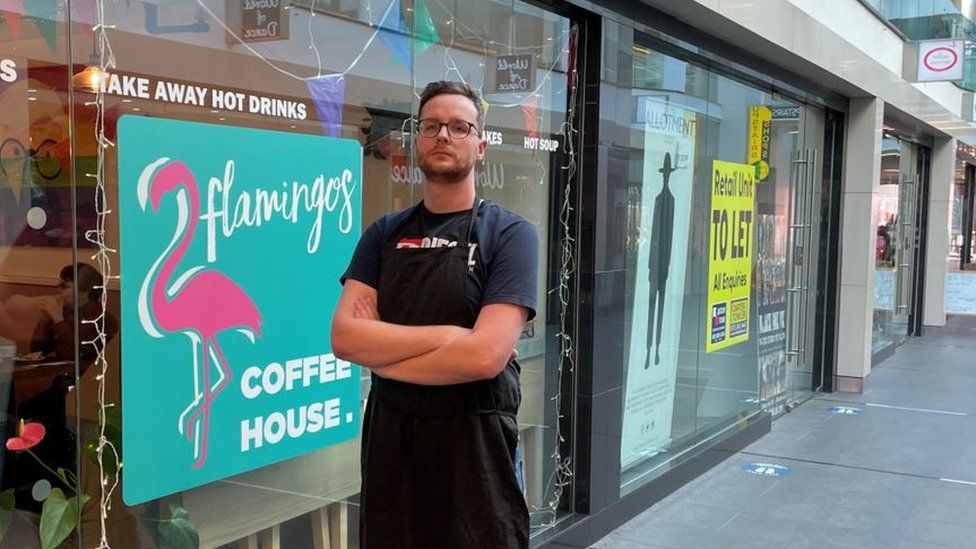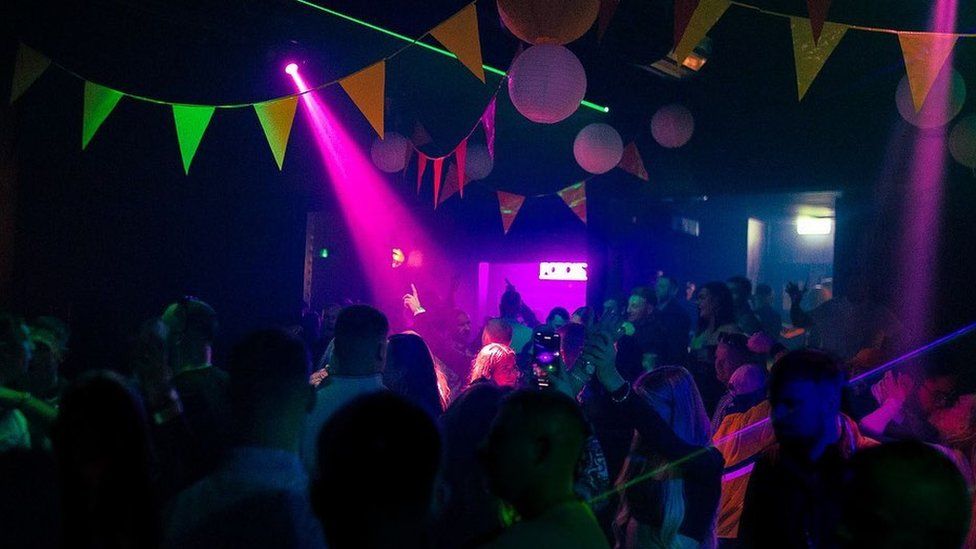
Working-from-home guidance has been lifted but the owner of one coffee shop that relies on office workers says he’s still nervous about the future.
“Ask me in a month how I’m doing,” says James Greenhalgh, the owner of Leeds-based Flamingos Coffee House.
He believes it will take months before confidence comes back.
Other firms are more positive about the changes in England, with one nightclub saying his customers will feel happier once Covid passes have been dropped.
Advice for people to work from home if they can in England has been dropped immediately.
The requirement for mandatory face coverings in public places and Covid passports will both be dropped from next Thursday.
Stephen Spensley, one of the directors of Stereo nightclub in Middlesbrough, said removing the need to show a Covid pass at the door would make his customers feel more welcome.
Customers had worried about the passes, sharply reducing the numbers coming to his 300-capacity club in the run-up to Christmas, Mr Spensley said.
While concern about the virus had eased in January, the requirement to show proof of either vaccination or a recent negative lateral flow test was still putting some customers off, he said.
“I think our demographic of 18 to 25-year-old clients will feel a lot freer, because a lot of them are hesitant about getting the vaccine,” Mr Spensely said.
Meanwhile, Mr Greenhalgh said the reintroduction of working-from-home guidance in December had been “a catastrophe” for his coffee shop and “custom went off a cliff”.
December is normally his busiest trading period, and sustains the shop in the early part of the next year.
“These are normally the busiest days of the year, and there were days when we were stood around, and no-one came in,” he said. “It’s been a disaster.”
Thousands of hospitality businesses have been hit hard by the pandemic, and Plan B restrictions helped push many into trouble, according to insolvency firm Real Business Rescue.
In December, for example, more than 6,100 bars and pubs were in “significant financial distress” it said, more than a fifth more than in the same period last year.

But some café businesses have managed to diversify.
One coffee business that has expanded into e-commerce is Grind, which has eight shops in London.
It started selling compostable Nespresso-compatible coffee pods before the pandemic, and business has taken off, according to founder and chief executive David Abrahamovitch.
“That side of the business was helped by Plan B,” he says. “If people are working at home they are more likely to drink [coffee] at home.”
He is expecting the business to have made £20m in sales for the year, and has plans to expand into the US and Europe after a cash injection of £22m, mainly from UK investor Richard Koch.

Financial support
Michael Kill, of the Night Time Industries Association (NTIA), said clubs in England had lost around 20% of their footfall while Covid passes were in place.
The “debilitating restrictions” had meant queues outside clubs were longer, he said, because security staff were trying to check Covid passes on top of checking people’s age ID, in low lighting.
“What we’re finding when people come up is there’s frustration, from the challenges around exemptions, to civil liberties, accusations of discrimination.”
Mr Kill said without question the sector would need further financial support from the government.
Mr Spensely said the extra Covid pass checks had added 20% to his staffing costs because he needs twice the number of security staff at the entrance.
“Its an extra layer of bureaucracy” said Mr Spensely “It slows the queue right down.”
Peter Marks, chief executive of Rekom, which has 42 venues including chains Pryzm, Bar&Beyond, Eden and Fiction, said vaccine passports “took 30% off our business”.
“I’m not as critical as you’d think of Covid passports,” he said. “It’s better than being shut, but it definitely affected us.”
Tristan Moffat, operations director of The Piano Works, which has two late night live music venues in central London, said “there’ll be a lot of jubilation” about Wednesday’s announcement.
“We’re certainly delighted about it,” he said.
While Covid passes had caused frustration among some customers, others had found them reassuring.
But other aspects of the Plan B restrictions, such as working from home guidance, had taken a “huge toll” on the business, as mid-week trade had fallen away, he said.
Industry group UK Hospitality said the removal of restrictions was “a key milestone on the road to recovery for the sector”.
“Lifting the working from home recommendation is a particularly important move as it enables town and city centres, and the businesses that are their lifeblood, to begin their revival and recovery,” said UK Hospitality chief executive Kate Nicholls.
